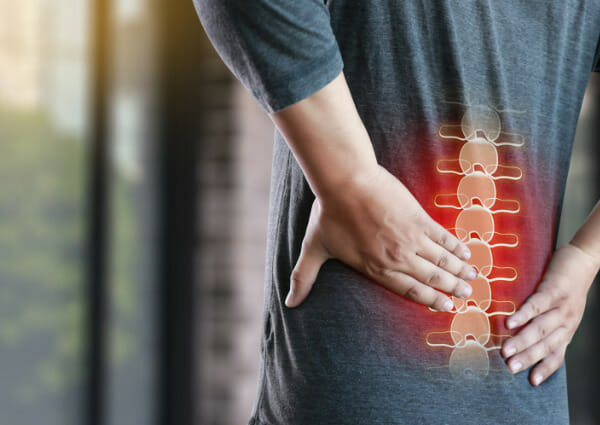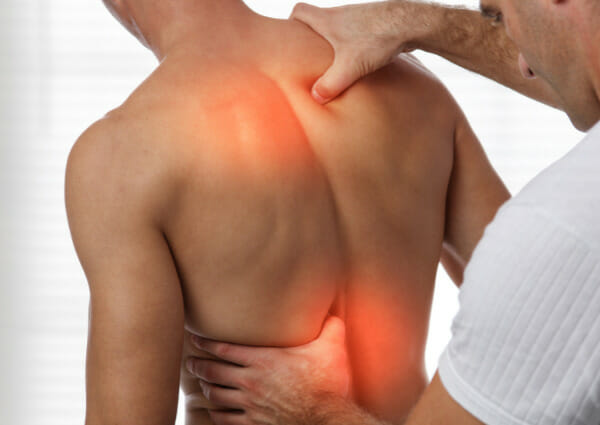6 Signs Your Sudden Lower Back Pain Is Serious

Did you know that back pain is the sixth most costly condition in the United States?
According to the Health Policy Institute, 65 million Americans suffer from back pain, and nearly 16 million have chronic conditions affecting their quality of life. However, when you notice the sudden onset of severe and acute pain, it could indicate a more serious underlying issue.
If you’re worried about your acute back pain, here are some tell-tale signs that you need to have a physical exam with one of our specialists as soon as possible.
Chronic Pain Versus Acute Back Pain

Before delving into serious back pain symptoms, looking at the difference between acute and chronic pain may be helpful.
Chronic Back Pain
Chronic back pain can be dangerous. Because the symptoms of persistent pain are severe enough to have a long-term negative influence on your health, movement, and quality of life.
Where there is the possibility of a quick onset, persistent back pain typically develops gradually and lasts for more than six weeks.
What leads to persistent back pain? A fresh injury can result in chronic pain, but more often than not, underlying disorders are to blame. One of the most frequent causes of muscle deconditioning, which results in your back lacking stability and strength, is obesity.
Acute Back Pain
If your low back pain is acute, it’s likely that it started unexpectedly. Stress, vigorous activity, awkward movement, or incorrect lifting techniques are all possible causes of acute back pain.
It lasts just a few days or weeks, unlike chronic pain that can last for months if not addressed properly. Acute pain can be serious or harmless, depending on the symptoms, response to self-care, and other risk factors.
Since acute pain is often not severe enough to stop you from your daily activities, how do you tell when it is life-threatening and requires emergency medical attention? Keep reading below.
Signs That Your Back Pain Is Serious

In the section below, we’ll cover common signs that your back pain is a cause for concern.
1. Leg Weakness
Compressed spinal nerves from disorders, such as spinal stenosis or sciatica can lead to limb paralysis. However, an unexpected or sudden onset of leg weakness might also be a sign of a stroke, so if your lower back pain causes weakness in your legs out of the blue, it’s time to head to the emergency room or consult with a physician.
2. A Sharp Pain Rather Than a Dull Ache
Muscle strain can lead to chronic back pain that increases in severity over time. However, if you notice a sudden, sharp pain, this could indicate that you have a torn muscle or ligament. It could also indicate a problem with an internal organ and must be addressed quickly to prevent further harm.
3. Self-care Isn’t Helping
If you’ve been suffering severe pain in your back that doesn’t heal with self-care and rest, it may be time to see a physician. There could be a number of reasons for this, so the best way to get pain relief from your chronic low back pain is to receive treatment and physical therapy, if deemed necessary by your doctor.
4. Radiating Pain
If your lower back pain radiates or affects your legs it may be a sign of other health issues associated with your back ache.
Your spinal cord contains nerves that travel to your lower limbs, allowing for communication between your brain and the muscles of the legs.

Remaining seated for extended periods every day can cause your vertebrae to shift, which can compress your sciatic nerve. This nerve compression could be a tingling or burning sensation in the legs. Although many people live with sciatica, when the compression of the nerve leads to restricted blood flow, it could lead to an emergency.
Moreover, if your back pain radiates to your upper body or abdomen, it could be an indication of an abdominal aortic aneurysm, which is a serious medical condition. Consult with your physician to get the right medical advice for your radiating pain.
5. Incontinence
Back pain and loss of bladder or bowel control could be symptoms of severe nerve compression or a spinal infection, such as meningitis or discitis.
The truth is that if left untreated, these infections of the nervous system could lead to septicemia or blood poisoning that could permanently damage nerves and brain tissue.
This is why it is highly advised to seek medical advice from your physician if your back pain is accompanied by incontinence.
6. A Tingling Sensation in the Groin
Pain, numbness, weakness, and tingling in the thighs or groin could be signs of a pinched nerve in the knee, thigh, or lower back. A compressed nerve can cause pain to spread down the spinal nerve roots to other parts of the body.
Frequently Asked Questions
Here are the answers to some of the most-asked questions about sudden low back pain.
1. When Should I Worry About Back Pain That Occurs Suddenly?
In general, if your back pain radiates to other parts of the body or accompanies numbness, incontinence, weakness, or other symptoms, it’s time to receive medical treatment.
[Read: How to Get Rid of Pain in Neck and Shoulder Radiating Down Arm]
2. How Do I Know If My Lower Back Pain Is Serious?
If your lower back pain doesn’t improve with rest and self-care, it is likely a more serious issue that needs a doctor’s help.
3. How Do You Get Rid of Sudden Low Back Pain?
The treatment used to relieve pain depends on what’s causing the pain. At the Vascular International Specialists of Prescott, we offer the following back pain procedures:
- Nerve block procedures
- Epidurals
- Cortisone injections
- Vertebral cement augmentation
4. Is Sudden Back Pain Normal?
Yes, sudden back pain can occur from time to time after your muscles have been strained from repetitive movement. Symptoms usually last after a few hours or days and respond to self-care. If this is not the case and your pain persists, seek medical advice from your physician.
5. How Can I Prevent Chronic Pain in My Back?
If you’d like to prevent serious conditions, here are a few things you can do:
- Maintain a healthy weight
- Avoid heavy lifting
- Exercise and stretch regularly (Note: Not all exercises are good for back pain. Read here the 5 exercises that could lead to long-term damage.)
Talk to a Back Pain Specialist About Your Treatment Options

If back pain is affecting your quality of life, you can talk to one of our experienced back pain specialists to find out more about your condition and possible treatments. Always remember that it is important not to leave your back pain untreated.
To find out more about your symptoms or schedule a consultation with our physicians, call the Vascular and Interventional Specialists of Prescott today at (928) 771-VISP (8477)!
Vascular & Interventional Specialists of Prescott was formed in 2010 by a group of subspecialty radiologists that perform numerous minimally-invasive, low-risk procedures using the tools of our trade for guidance—x-ray, ultrasound, CT scan, and MRI. The team’s goal is to educate patients and medical communities, while also providing safe and compassionate health care, with rapid recovery times and low risk of complications.
